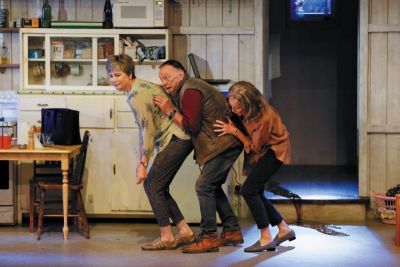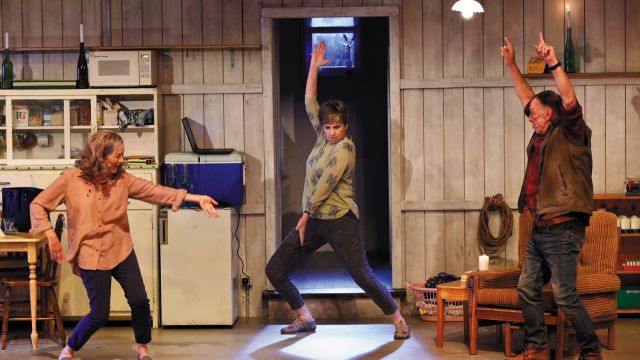The Children
Playwright Lucy Kirkwood says she writes about “things where the roots of the emotions and ideas go deep and the branches go high”. In The Children she looks at personal and political decisions made in the past – and their effects on the present and the future. She questions a range of values and why we hang on to them in the face of “changes that are enormous and frightening”.
She does so in a way that is very personal and therefore introspective. Her characters are intricately drawn. Their dialogue is frighteningly natural – funny at times, deeply contemplative at others – their relationships interwoven with love and deceit and the intimacy of years. The decisions they are asked to make is what theatre is about: reflecting society and questioning who we are.
Hazel and Robin are retired nuclear physicists, renting a sparsely decorated cottage where the sound of the sea is a constant reminder of the earthquake and tsunami that destroyed the nearby nuclear power plant where they used to work. They live frugally in a “new climate of scarcity” shaped by the effects of the disaster. Water is limited and has to be filtered. They keep candles handy and eat mainly salads because the electricity supply is too intermittent to depend on for light or heat for cooking. When their former colleague, Rose, arrives unexpectedly, she shatters their apparent complacency and raises the consequences of decisions made a lifetime ago.
Sarah Goodes directs the play with the respect and nurture it deserves. There is searching depth in her vision; a discriminating appreciation of the writing; an astute understanding and analysis of the complexities of the characters – portrayed, as she herself says, by three of “this country’s finest actors”.
 Pamela Rabe is disconcertingly genuine as Hazel, a woman who has always striven for perfection – as a scientist, wife and mother. Rabe always get completely inside her characters and the Hazel she has conceived is meticulous, querulous, quick-witted, resolute, accepting. She moves economically, reacts perceptively, using the household minutiae required of her character to become uncannily natural. In fact, designer Elizabeth Gadsby “worked closely with Pamela Rabe to make sure the props felt like an extension of how her character would organise the kitchen and living area”.
Pamela Rabe is disconcertingly genuine as Hazel, a woman who has always striven for perfection – as a scientist, wife and mother. Rabe always get completely inside her characters and the Hazel she has conceived is meticulous, querulous, quick-witted, resolute, accepting. She moves economically, reacts perceptively, using the household minutiae required of her character to become uncannily natural. In fact, designer Elizabeth Gadsby “worked closely with Pamela Rabe to make sure the props felt like an extension of how her character would organise the kitchen and living area”.
William Zappa, as Robin, juxtaposes yet also compliments Hazel’s tight control. Zappa makes Robin looser, more down-to-earth, centred rather than controlled. He lounges carelessly, jokes persistently, until secrets, past and present, shatter the illusionary equilibrium he has maintained for years. Zappa matches every nuance in the dialogue with perceptive, instinctive reactions.
Sarah Peirse is an intuitive performer, analytical and discerning. In Rose, she finds all the complication of qualities with which Kirkwood has endowed the character – intelligence, independence, envy, loneliness, secrecy, suffering, and guilt. Peirse contains and restrains the character, watching carefully, choosing or rejecting a moment, always aware of the effect she is having, and the effect her reason for coming will have.
In the confines of Gadsby’s austere yet carefully hued set, where candle light (designed by Paul Jackson) reflects off timber walls and ceiling and refracts off bottles and jars, the characters recoil and rebound, bare secrets, share happy moments … and judiciously expose the fallout that comes of failing to accept what is happening to the world. The tension they create is tangible, their final decisions submerged in watery reflections and the thundering crash of waves.
Carol Wimmer
Photographer: Jeff Busby
Subscribe to our E-Newsletter, buy our latest print edition or find a Performing Arts book at Book Nook.

